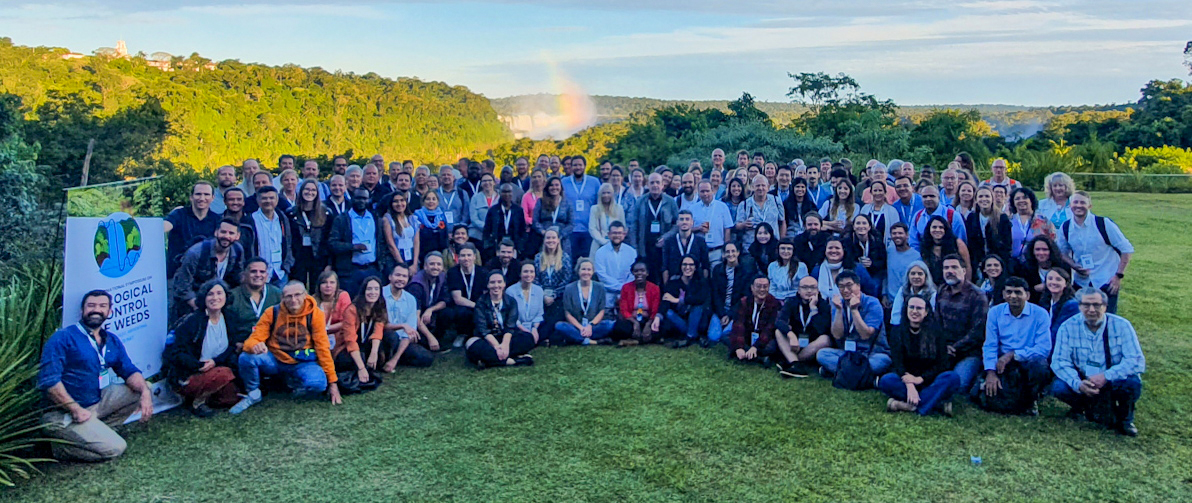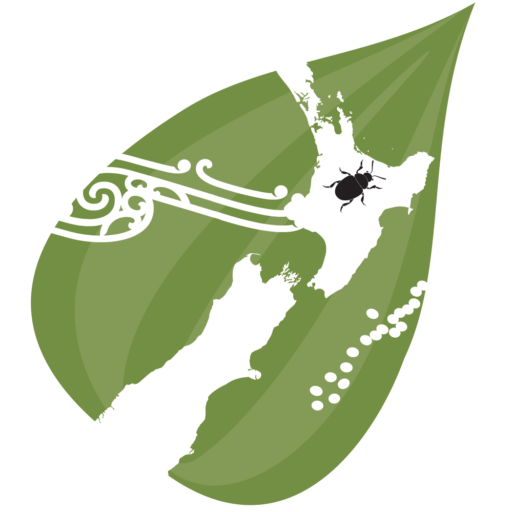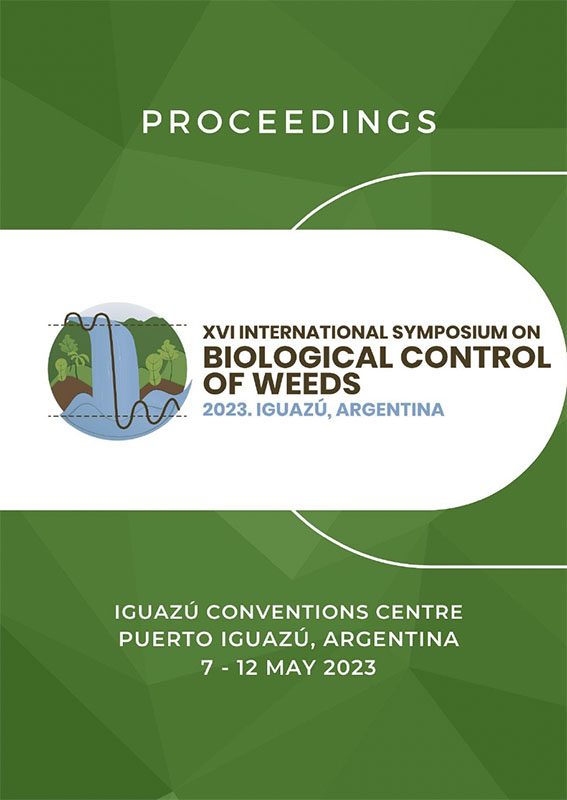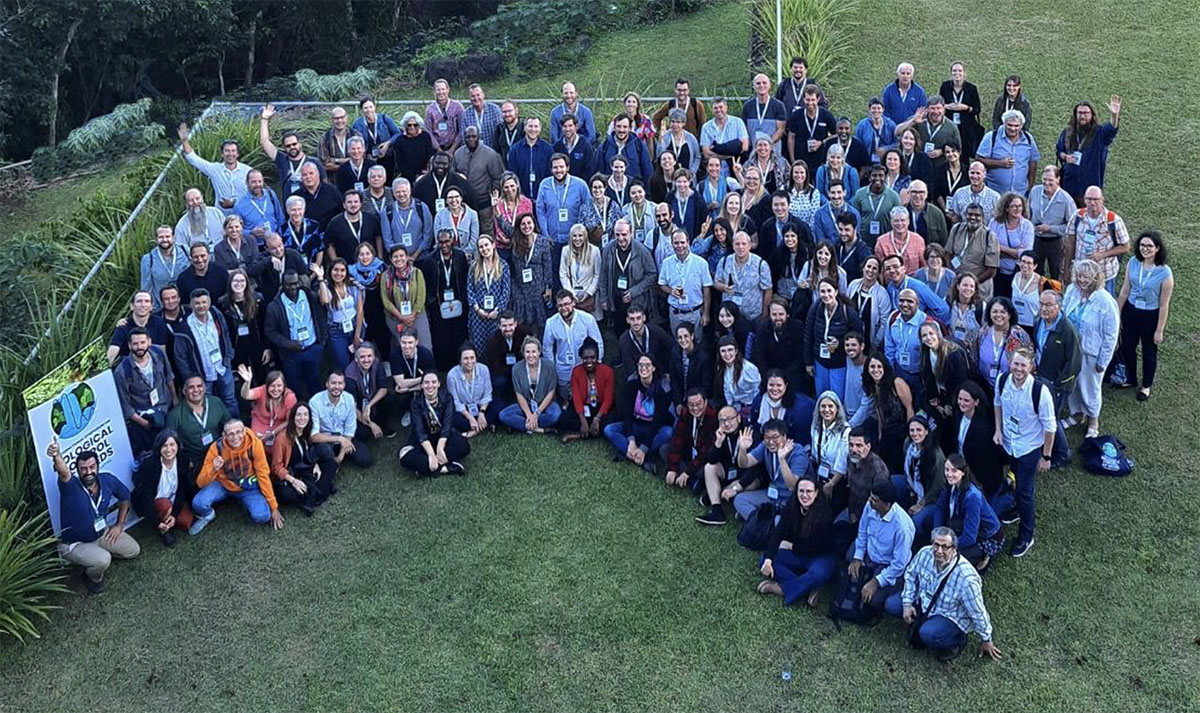Classical Weed Biological Control (CWBC)
The IOBC-Global Study Group on Classical Weed Biological Control was formed during the 15th International Symposium on Biological Control of Weeds (ISBCW) in Engelberg, Switzerland in August 2018. During the subsequent ISBCW in Argentina, the group had its first official meeting and can now call itself a Global Working Group.
Current co-convenors include
- Hariet L. Hinz (chair), CABI Switzerland
- Chris Borkent, California Department of Food and Agriculture, USA
- Angela Bownes Manaaki Whenua – Landcare Research, New Zealand
- Guillermo Cabrera Walsh, FuEDEI, Argentina
- Jason Callander, Queensland Department of Agriculture and Fisheries, Australia
- David Ensing, Agriculture and Agri-Food Canada
- Iain Paterson, Rhodes University, Centre for Biological Control, South Africa
- Michelle Rafter, CSIRO, Australia
- Melissa Smith, USDA-ARS, USA
This composition is different to other IOBC-Global Working Groups, which usually have one convenor and potentially a deputy convenor. However, we felt that each of the countries or regions particularly active in classical weed biocontrol should be represented.
The group has three main objectives:
- Support activities in between ISBCW meetings
We are planning to organize webinars, likely 1-2 times per year, to discuss weed biocontrol related subjects in between the 4-yearly Symposia. These could for instance cover specific technical aspects and new methods or could be much broader with the aim of giving an overview of the current status and/or challenges in specific regions or countries. - Develop an attractive and useful website
We have developed an interactive global map to depict biocontrol facilities and institutions to facilitate collaboration and exchange among biocontrol scientists and practitioners and to increase awareness outside of the biocontrol community. If your institution is involved in classical weed biocontrol activities, please take the survey below so that it will be depicted on the map. On the left hand side, all agencies entered so far are listed, while more detailed information on each agency, including research areas, can be found in the center below the map. Please report any issues with the map or suggestions to Hariet Hinz at: h.hinz@cabi.org - Support updates and maintenance of the 'World Catalogue of Agents and Their Weeds'
We believe everybody agrees that the catalogue is an essential and powerful resource for the global biocontrol community. Keeping it up to date is the pre-requisite for its usefulness. The last update and current maintenance has mainly been supported by the U.S. Forest Service and by ibiocontrol (University of Georgia, USA), which is hosting the online version of the catalogue. To increase ownership and spread the financial risk of future updates, we are looking at ways to access end-year funding from organisations, grants, and individual contributions.

Participants of the XVI International Symposium on Biological Control of Weeds in 2023 in Puerto Iguazú, Argentina, where the first official meeting of the Global Working Group on Classical Weed Biological Control took place.
 Join us at the XVII International Symposium on Biological Control of Weeds (ISBCW2026) in Rotorua, Aotearoa New Zealand, 8 – 13 March 2026!
Join us at the XVII International Symposium on Biological Control of Weeds (ISBCW2026) in Rotorua, Aotearoa New Zealand, 8 – 13 March 2026!
This is the premier meeting for those involved in weed biocontrol, an inherently international discipline. We encourage you to visit the ISBCW2026 website for more details. Abstract and symposium submissions are now open!
Contacts Worldwide
Load the interactive Dashboard in a separate page here.
If you find broken links in the dashboard please contact the Dashboard manager.
If you need to update or add to your data in the dashboard please contact Chris Borkent with specifics.
Are you interested in undertaking weed biological control?
"A World Catalogue of Agents and Their Weeds" can be accessed through the following link: https://www.ibiocontrol.org/catalog/index.cfm
Please note, all weed biological control activity is, and needs to be, done in strict compliance with the policies and regulations specific to each country. This enables this applied scientific activity to be undertaken in a responsible manner that considers the risks, costs and benefits of release of classical biological control agents into any country. If you are unsure of this process, please contact the convenors of this Study/Working Group.
As you might be aware, the Nagoya Protocol on Access and Benefit-Sharing entered into force on 12 October 2014, and is an instrument to further develop access and benefit-sharing (ABS) obligations set under the Convention on Biological Diversity (CBD). Unfortunately, each of the 141 current parties to the Nagoya Protocol, has their own way of implementing the Protocol, some not restricting access to their genetic resources at all (most European countries), while others requiring Prior Informed Consent (PIC) and Mutually Agreed Terms (MAT) for non-commercial utilization, as is the case for classical weed biological control. The Access and Benefit-Sharing Clearing-House website provides information on the status of all countries in relation to the Nagoya Protocol and is a good first starting point https://absch.cbd.int/en/countries. The German Nagoya Protocol HuB is another good resource more specifically aimed at academic and other non-commercial research https://www.nagoyaprotocol-hub.de. Once our global map of biocontrol facilities and institutions is more populated, this might provide another way to obtain information on country specific ABS regulations.
International Symposium on Biological Control of Weeds
Since 1969, an International Symposium on Biological Control of Weeds (ISBCW) has been held every 3-4 years. The Proceedings of ISBCW can be accessed through the following links
Volume I - Published 1969 (1st ISBCW; Delemont, Switzerland)
Volume II - Published 1971 (2nd ISBCW; Rome, Italy)
Volume III - Published 1973 (3rd ISBCW; Montpellier, France)
Volume IV - Published 1973 (4th ISBCW; Gainesville, Florida, USA)
Volume V - Published 1980 (5th ISBCW; Brisbane, Australia)
Volume VI - Published 1984 (6th ISBCW; Vancouver, British Columbia, Canada)
Volume VII - Published 1988 (7th ISBCW; Rome, Italy)
Volume VIII - Published 1992 (8th ISBCW; Canterbury, New Zealand)
Volume IX - Published 1996 (9th ISBCW; Stellenbosch, South Africa)
Volume X - Published 1999 (10th ISBCW; Bozeman, Montana, USA)
Volume XI - Published 2003 (11th ISBCW; Canberra, Australia)
Volume XII - Published 2007 (12th ISBCW; Montpellier, France)
Volume XIII - Published 2013 (13th ISBCW; Hawaii, USA)
Volume XIV - Published 2014 (14th ISBCW; Kruger National Park, South Africa)
Volume XV - Published 2019 (15th ISBCW; Engelberg, Switzerland)
Volume XVI - Published 2023 (16th ISBCW; Iguazu, Argentina)
 Cabrera Walsh G., Anderson F.E., Mc Kay F., Sosa A.J. and Hernández M.C., eds., 2023.
Cabrera Walsh G., Anderson F.E., Mc Kay F., Sosa A.J. and Hernández M.C., eds., 2023.
Proceedings of the XVI International Symposium on Biological Control of Weeds.
Puerto Iguazú, Argentina, 7 – 12 May 2023, 216 pp.
ISBN 978-631-90256-0-6
Download: Proceedings 16th ISBCW 2023 (pdf)

Participants of the XVI International Symposium on Biological Control of Weeds. Puerto Iguazú, Argentina, 7 – 12 May 2023.